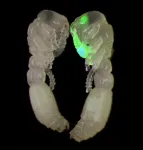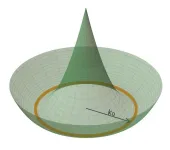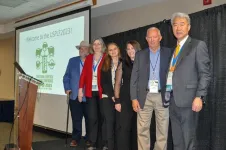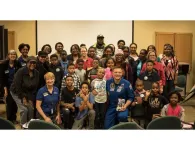(Press-News.org) Neuroscientists have long searched for ways to reopen “critical periods” in the brain, when mammals are more sensitive to signals from their surroundings that can influence periods of brain development. Now, researchers at Johns Hopkins Medicine say a new study in mice shows that psychedelic drugs are linked by their common ability to reopen such critical periods, but differ in the length of time the critical period is open — from two days to four weeks with a single dose.
The findings, published June 16 in the journal Nature, provide a new explanation for how psychedelic drugs work, say the scientists, and suggest potential to treat a wider range of conditions, such as stroke and deafness, beyond those in current studies of the drugs, such as depression, addiction and post-traumatic stress disorder. The scientists also provide a new look at molecular mechanisms impacted by psychedelics.
Critical periods have been demonstrated to perform such functions as help birds learn to sing and help humans learn a new language, relearn motor skills after a stroke and establish dominance of one eye over the other eye.
“There is a window of time when the mammalian brain is far more susceptible and open to learning from the environment,” says Gül Dölen, M.D., Ph.D., associate professor of neuroscience at the Johns Hopkins University School of Medicine. “This window will close at some point, and then, the brain becomes much less open to new learning.”
Building on her laboratory’s experience studying social behavior, Dölen’s team has been researching how psychedelic drugs work by reopening these critical periods. In 2019, her team found that MDMA, a psychedelic drug that arouses feelings of love and sociability, opens a critical period in mice.
At the time, Dölen thought MDMA’s prosocial properties smooth the way for opening the critical period, but her team was surprised, she says, to find in the current study that other psychedelic drugs without prosocial properties could also reopen critical periods.
For the current study, Dölen’s team looked at the reopening potential of five psychedelic drugs — ibogaine, ketamine, LSD, MDMA and psylocibin — shown in numerous studies as able to change normal perceptions of existence and enable a sense of discovery about one’s self or the world.
The research team conducted a well-established behavioral test to understand how easily adult male mice learn from their social environment. They trained mice to develop an association between an environment linked with social interaction versus another environment connected with being by themselves. By comparing time spent in each environment after giving the psychedelic drug to the mice, the researchers were able to see if the critical period opened in the adult mice, enabling them to learn the value of a social environment — a behavior normally learned as juveniles.
For mice given ketamine, the critical period of social reward learning stayed open in the mice for 48 hours. With psilocybin, the open state lasted two weeks. For mice given MDMA, LSD and ibogaine, the critical period remained open for two, three and four weeks, respectively.
The researchers say the length of time that the critical period stayed open in mice seems to roughly parallel the average length of time that people self-report the acute effects of each psychedelic drug.
“This relationship gives us another clue that the duration of psychedelic drugs’ acute effects may be the reason why each drug may have longer or shorter effects on opening the critical period,” says Dölen.
“The open state of the critical period may be an opportunity for a post-treatment integration period to maintain the learning state,” she adds. “Too often, after having a procedure or treatment, people go back to their chaotic, busy lives that can be overwhelming. Clinicians may want to consider the time period after a psychedelic drug dose as a time to heal and learn, much like we do for open heart surgery.”
Next, the scientists looked at psychedelic drugs’ impact on molecular mechanisms. First, in mouse brain cells, they examined a binding point, known as a receptor, for the neurotransmitter serotonin. The researchers found that while LSD and psilocybin use the serotonin receptor to open the critical period, MDMA, ibogaine and ketamine do not.
To explore other molecular mechanisms, the research team turned to ribonucleic acid (RNA), a cousin to DNA that represents which genes are being expressed (producing proteins) in the mice’s cells. The researchers found expression differences among 65 protein-producing genes during and after the critical period was opened.
About 20% of these genes regulate proteins involved in maintaining or repairing the extracellular matrix — a kind of scaffolding that encases brain cells located in the nucleus accumbens, an area associated with social learning behaviors that are responsive to rewards.
No authors declared conflicts of interest related to this research under Johns Hopkins University School of Medicine policies.
Funding for the research was provided by the Klingenstein-Simons Foundation, the Kavli Neuroscience Discovery Institute Distinguished Postdoctoral Fellowship, the Johns Hopkins Provost’s Postdoctoral Fellowship Program and the National Institutes of Health (R01MH117127, R01HD098184, R01AG066768, R01AG072305, K99NS122085).
Others who helped conduct the research were Romain Nardou, Edward Sawyer, Young Jun Song, Makenzie Wilkinson, Yasmin Padovan-Hernandez, Júnia Lara de Deus, Noelle Wright, Carine Lama, Sehr Faltin, Loyal Goff and Genevieve Stein-O’Brien from Johns Hopkins.
END
Study shows psychedelic drugs reopen ‘critical periods’ for social learning
Scientists say the findings in mice offer a new explanation for how psychedelic drugs work
2023-06-14
ELSE PRESS RELEASES FROM THIS DATE:
Building a new vaccine arsenal to eradicate polio
2023-06-14
Despite some of the most successful international vaccination campaigns in history, the poliovirus continues to circulate around the world, posing a threat of neurological damage and even paralysis to anyone who is not vaccinated.
While the original polio strains, called wildtype, have largely been eliminated, new strains can develop from the oral polio vaccine (OPV), which is the one most used in the developing world. Oral vaccines use live, weakened virus that occasionally mutates to an active form, leading to outbreaks even in countries believed to have eliminated polio.
Scientists at UCSF and the UK’s National Institute of Biological Standards and Control (NIBSC) have developed ...
Food allergy is highest among Hispanic, Black and Asian individuals
2023-06-14
· Many racial and ethnic groups not well aware of food allergies
· Lack of food allergy research in racial and ethnic communities
· ‘These individuals need to be aware so they can be diagnosed and treated’
CHICAGO --- Food allergy has not been on the radar of most racial and ethnic communities. But a new Northwestern Medicine study — the first population-based food allergy study in the U.S. to explore racial and ethnic differences in all age groups — shows why it should be.
The new study found the prevalence of food allergy is highest among Hispanic, non-Hispanic Black and ...
World’s first transgenic ants reveal how colonies respond to an alarm
2023-06-14
Ants navigate their richly aromatic world using an array of odor receptors and chemical signals called pheromones. Whether foraging or defending the nest, mating or tending to their young, ants both send and receive chemical signals throughout their lives. The importance of this system is underscored by how well equipped the ant brain is to process the abundance of scents: The olfactory processing center in the ant’s brain has 10 times as many subdivisions as fruit flies do, for example, even though their brains are about the same size.
And yet how the ant olfactory system encodes scent data has remained largely unknown. To whittle ...
For experimental physicists, quantum frustration leads to fundamental discovery
2023-06-14
AMHERST, Mass. – A team of physicists, including University of Massachusetts assistant professor Tigran Sedrakyan, recently announced in the journal Nature that they have discovered a new phase of matter. Called the “chiral bose-liquid state,” the discovery opens a new path in the age-old effort to understand the nature of the physical world.
Under everyday conditions, matter can be a solid, liquid or gas. But once you venture beyond the everyday—into temperatures approaching absolute zero, things smaller than a fraction ...
Metamaterials with built-in frustration have mechanical memory
2023-06-14
Researchers from the UvA Institute of Physics and ENS de Lyon have discovered how to design materials that necessarily have a point or line where the material doesn’t deform under stress, and that even remember how they have been poked or squeezed in the past. These results could be used in robotics and mechanical computers, while similar design principles could be used in quantum computers.
The outcome is a breakthrough in the field of metamaterials: designer materials whose responses are determined by their structure rather than their chemical composition. To construct a metamaterial with mechanical memory, physicists ...
Earth was created much faster than we thought. This makes the chance of finding other habitable planets in the Universe more likely
2023-06-14
When we walk around in our everyday life, we might not think of the Earth itself very often. But this planet is the foundation of our life. The air we breathe, the water we drink and the gravity that pins us to the ground.
Up until now, researchers believed that it took more than 100 million years for the Earth to form. And it was also common belief that water was delivered by lucky collisions with water-rich asteroids like comets.
However, a new study from the University of Copenhagen suggests that it might not have happened entirely by chance.
“We show that the Earth formed by the very ...
A scorching-hot exoplanet scrutinized by UdeM astronomers
2023-06-14
An international team led by Stefan Pelletier, a Ph.D. student at Université de Montréal's Trottier Institute for Research on Exoplanets announced today having made a detailed study of the extremely hot giant exoplanet WASP-76 b.
Using the MAROON-X instrument on the Gemini-North Telescope, the team was able to identify and measure the abundance of 11 chemical elements in the atmosphere of the planet.
Those include rock-forming elements whose abundances are not even known for giant planets in the Solar System such as Jupiter or Saturn. The team's study is published in ...
A growing number of producers and industries interested in precision livestock farming
2023-06-14
Some of the world’s best minds that are focused on profitable and sustainable livestock production attended and presented at the recent Second U.S. Precision Livestock Farming Conference. Hosted by University of Tennessee AgResearch, the May 21-24 event at the UT Conference Center in Knoxville attracted 219 attendees representing 22 countries and 32 U.S. states. Participants included academics, representatives of government agencies and allied industries as well as producers. The conference had a central theme of “Field Application of PLF Technologies” and academic presentations along with two industry and producer panels included interactive dialogues among the attendees ...
It takes a village: Study shows community is key to a sustained passion for science among adolescents
2023-06-14
The results of a yearlong science program show that one of the best ways to instill a lasting interest in science among children is to engage them alongside their family members. This finding runs counter to the current framework, in which children attend science-related summer camps and after-school programs apart from their families, diminishing the long-term potential of what they learn.
“We wanted to see if we could support families as a whole, as opposed to giving a student a really amazing one-off experience and sending them ...
Racial disparities found in one of first studies of pharmacological treatment of insomnia
2023-06-14
INDIANAPOLIS — In one of the first studies to investigate racial disparities in the pharmacologic treatment of insomnia, researchers from Regenstrief Institute and Indiana University report that patients belonging to racial minority groups were significantly less likely to be prescribed medication following diagnosis of insomnia than White patients.
The study found that Black patients were much less likely to have been prescribed an FDA-approved insomnia medication at any time post diagnosis than White patients. Other non-White individuals were significantly less likely to be prescribed an FDA-approved medication two, three, and four years after insomnia diagnosis ...
LAST 30 PRESS RELEASES:
Scientists discover why we know when to stop scratching an itch
A hidden reason inner ear cells die – and what it means for preventing hearing loss
Researchers discover how tuberculosis bacteria use a “stealth” mechanism to evade the immune system
New microscopy technique lets scientists see cells in unprecedented detail and color
Sometimes less is more: Scientists rethink how to pack medicine into tiny delivery capsules
Scientists build low-cost microscope to study living cells in zero gravity
The Biophysical Journal names Denis V. Titov the 2025 Paper of the Year-Early Career Investigator awardee
Scientists show how your body senses cold—and why menthol feels cool
Scientists deliver new molecule for getting DNA into cells
Study reveals insights about brain regions linked to OCD, informing potential treatments
Does ocean saltiness influence El Niño?
2026 Young Investigators: ONR celebrates new talent tackling warfighter challenges
Genetics help explain who gets the ‘telltale tingle’ from music, art and literature
Many Americans misunderstand medical aid in dying laws
Researchers publish landmark infectious disease study in ‘Science’
New NSF award supports innovative role-playing game approach to strengthening research security in academia
Kumar named to ACMA Emerging Leaders Program for 2026
AI language models could transform aquatic environmental risk assessment
New isotope tools reveal hidden pathways reshaping the global nitrogen cycle
Study reveals how antibiotic structure controls removal from water using biochar
Why chronic pain lasts longer in women: Immune cells offer clues
Toxic exposure creates epigenetic disease risk over 20 generations
More time spent on social media linked to steroid use intentions among boys and men
New study suggests a “kick it while it’s down” approach to cancer treatment could improve cure rates
Milken Institute, Ann Theodore Foundation launch new grant to support clinical trial for potential sarcoidosis treatment
New strategies boost effectiveness of CAR-NK therapy against cancer
Study: Adolescent cannabis use linked to doubling risk of psychotic and bipolar disorders
Invisible harms: drug-related deaths spike after hurricanes and tropical storms
Adolescent cannabis use and risk of psychotic, bipolar, depressive, and anxiety disorders
Anxiety, depression, and care barriers in adults with intellectual and developmental disabilities
[Press-News.org] Study shows psychedelic drugs reopen ‘critical periods’ for social learningScientists say the findings in mice offer a new explanation for how psychedelic drugs work





